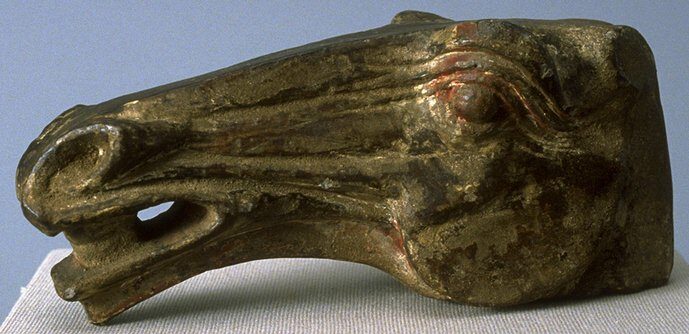Horse Head
Chinese

Description
Subject Matter:
Horses have been extremely important in China as vehicles for warfare since at least the Shang dynasty, as evidenced in the tombs kings and warlords that were accompanied by numerous sacrificial horses for use in the afterlife. Since the Qin dynasty, actual horses were replaced in tombs with ceramic representations.
During the prosperous Han dynasty, many different equestrian breeds were imported from Central and Western Asia. Their portrayal can be seen in a variety of media. Stylistically, they are shown as having powerful, stocky bodies on thin, agile, and presumably fast legs. Heads are usually held high, along with their tails, creating not only a visual balance but also a suggestion of movement. Countless ceramic horses of various sizes have been excavated from Han tombs, with a concentration excavated from the north and south central areas. In the tomb, their presence can help to indicate the wealth, power, and elite status of the occupant.
During the Eastern Han dynasty it is thought that northern kilns produced larger horse sculptures that were either sculpted by hand, molded, or a combination thereof, with the head and body and being fired separately. Most were unglazed and painted after firing with a combination of red, white, and black mineral pigments.
Physical Description:
A gray earthenware head from a horse sculpture vividly sculpted to show the musculature of the horse's face with flaring nostrils and an open mouth showing its tongue. It has deep set and bulging eyes and loss of ears and neck. The head has traces of red and white mineral pigment.
Usage Rights:
If you are interested in using an image for a publication, please visit https://umma.umich.edu/request-image/ for more information and to fill out the online Image Rights and Reproductions Request Form.